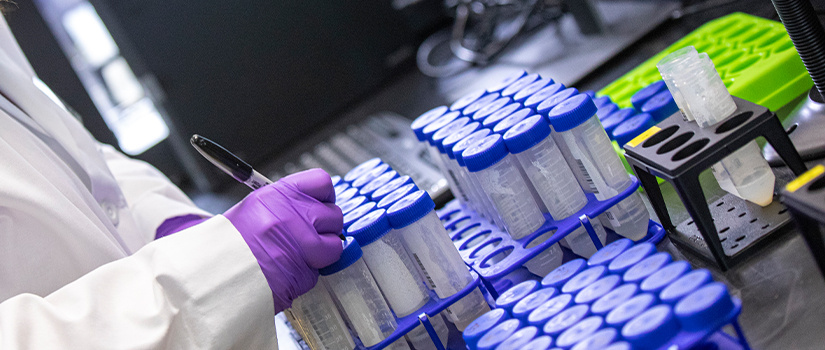UofSC researchers lead efforts to conduct diagnostic saliva testing
From the onset of the COVID-19 pandemic, leaders from across the University of South Carolina campus came together to determine the best methods to keep students, faculty and staff safe while continuing to provide the best educational experiences. That’s where College of Pharmacy and School of Medicine researchers stepped in.
Knowing that the ability to maximize the numbers of COVID-19 tests conducted would be key, Phillip Buckhaults, Michael Shtutman, Michael Wyatt and Dr. Helmut Albrecht began working on developing a test that could provide much quicker results than nasal swab tests, leading to the development of the saliva assay free expedited (SAFE) test.
To provide diagnostic results, the lab had to undergo a rigorous Clinical Laboratory Improvement Amendments (CLIA) certification process led by research assistant professor Carolyn Banister.
“She has worked 18 hours per day, seven days per week for months, putting her scientific research on hold in order to do something good for the university and the community,” Buckhaults says.
Alumni should be proud of what our Gamecock family is doing to meet the challenge.
Phillip Buckhaults, Ph.D. Associate Professor, College of Pharmacy
There have been important lessons learned from this experience, including the high incidence of asymptomatic carriers.
“It turns out that most college-age people are either mildly symptomatic or asymptomatic carriers of the virus. We have discovered this by SAFE testing and have been able to isolate people who would not otherwise know they were positive,” Buckhaults says. “This undoubtedly has already limited the spread to other more vulnerable members of our Gamecock family.”
Buckhaults believes other important information related to convalescent plasma therapy will come out of the testing.
“The supply of plasma donors is limited, because most people who have life-saving antibodies simply do not know that they do,” he says. “SAFE testing has created a large supply of potential donors among our students. If enough of our students donate their plasma, UofSC will make very important contributions to science and medicine.”
The CLIA-certified lab will also provide new opportunities for researchers and students long after the pandemic has ended, such as the ability to deploy diagnostic testing for future medical needs.
“University scientists will have a mechanism by which they can bring their lab-developed tests to the clinical market,” Buckhaults says. “For scientists focused on translational research, the CLIA lab will serve as an important bridge between the bench and the bedside for years to come.”
Buckhaults also credits the leadership of Dean Stephen Cutler.
“He has led from the front and bottom to top, from helping with sample collection, recruiting volunteers, helping to test the necessary software, working in the lab, but also working behind the scenes at the highest levels of university, state and federal levels to make this early dream in June a reality in August,” Buckhaults says. “Alumni should be proud of what our Gamecock family is doing to meet the challenge.”
